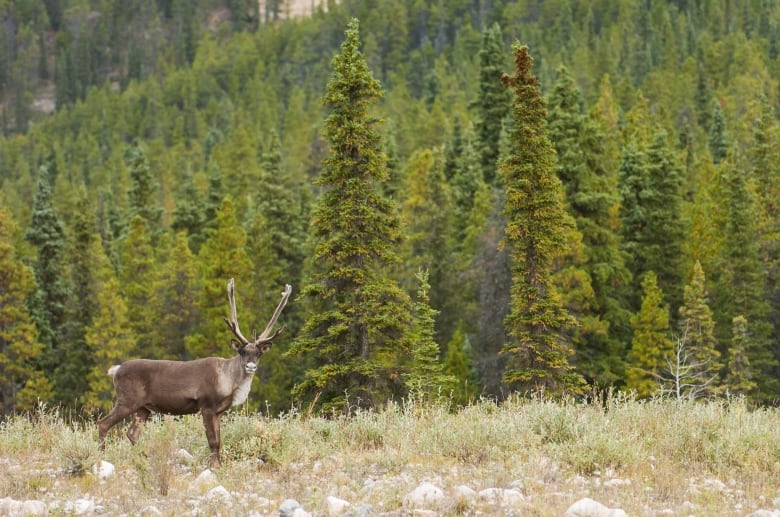Death threat aimed at Blueberry River First Nations chief over proposed changes to moose, caribou hunting
B.C. has suggested hunting reductions in Peace region to help meet treaty obligations

Chief Judy Desjarlais is still rattled days after receiving a voicemail threatening her and other members of the Blueberry River First Nations with death because of changes proposed to moose and caribou hunting rules in B.C.'s northeastern region.
"His message was straight anger," she said on the weekend after receiving the message Thursday. "It scared me a bit, I understand there is a lot of anger."
She believes the message was left in reaction to proposed interim changes by the province to close caribou hunting in B.C.'s Peace region and reduce moose hunting by half for two years. It's part of a greater plan to maintain the health of the herds and also uphold treaty rights involved in a landmark 2021 court decision.
"Nobody ever expects to get these calls but it's something out of anger and not being educated in the right manner," said Desjarlais.
'Shocked and angered'
There is significant opposition to the proposed hunting regulations in the Peace, but the offensive voicemail, which was shared with CBC News, has brought condemnation from Desjarlais, the province's forests minister, minister of Indigenous relations and reconciliation and local politicians.
On Friday in a joint statement Katrine Conroy, Murray Rankin and Dejarlais said the threat was, "illegal and abhorrent.
"We are shocked and angered after learning of recent threats of violence made against members of Blueberry River First Nations," it said.
The statement said the voicemail has been forwarded to local RCMP which is investigating. Officers want anyone with information to contact them.
The province is currently negotiating with Blueberry River First Nations over hunting regulations in its territories to help meet obligations from the Yahey v. British Columbia court decision from June 2021.
That ruling upheld Blueberry River's 2015 claim that years of extensive industrial development in the region violated their rights under Treaty 8. The treaty signed in 1899 covers northeastern B.C., northern Alberta and smaller parts of Saskatchewan and the N.W.T.
The court said the province failed to maintain the nation's rights to hunt, fish and trap without interference. While no single project had a devastating effect on the community, the court said the cumulative impact of a series of projects limited the nation's ability to maintain its rights.
'Experienced significant diminishment'
"Moose and caribou are of critical importance to the Treaty 8 way of life," said a statement from the ministry of forests. "The Treaty 8 Nations have experienced a significant diminishment of, and interference with, their way of life including their ability to successfully hunt moose and caribou."
Desjarlais said that hunting is a "big part of the way of life for all residents of northeast B.C., whether Indigenous or not," but wants people to understand the importance of treaty rights and negotiation with the province.
She said that although the province has published proposed changes that would affect the ability for people to hunt caribou and moose in the region, no final decision has been made.
"We believe moose have been affected by overdevelopment and that some temporary protections are required in some areas," she said in the joint statement. "As long as wildlife management and habitat restoration are managed sustainably, there can be a healthy hunting industry in future for everyone in northeast B.C."
Several groups representing hunters, outfitters and guides in the province have denounced the proposed changes.
They argue there is no ecological or scientific basis to reduce hunting. The solution instead is to stop habitat loss, particularly for caribou herds.

The B.C. Wildlife Federation, which condemned the death threats in a Twitter post, said the region has some of the highest populations of moose in B.C. and that hunting them along with caribou feeds nearly 6,000 residents and their families.
It said the proposed changes could cost up to $16 million in lost hunting-related economic activity.
It wants the province to turn its attention to better regulating the nearly 200 resource projects in the region.
"Ordinary British Columbians who hunt for food are being traded-off in favour of resource extraction," said BCWF executive director Jesse Zeman in a release.
Scott Ellis, CEO of the Guide Outfitters Association of B.C., said the proposed regulations from the province are not wanted by a majority of stakeholders, Indigenous and non-Indigenous, in their present form and will not remedy infringement of treaty rights.
He said dozens of guide businesses, many owned by First Nations, could fold over the next two years if the proposed regulations are pushed through because they will severely limit the ability to take licensed hunters, many from outside Canada, on hunts in the region.
'Trying to kill a mosquito with a sledgehammer'
His response to the province has been that it is "rushing a bad decision" and is "trying to kill a mosquito with a sledgehammer."
Both organizations fully support the rights of First Nations to hunt and fish in their traditional territories and note that all interested parties are pushing for better conservation and habitat restoration.
The province said it is consulting with hunting groups over new regulations, and is also looking to address the impacts of industrial development in the region.
With files from Cory Correia, Tony Seskus, Tom Popyck and Andrew Kurjata